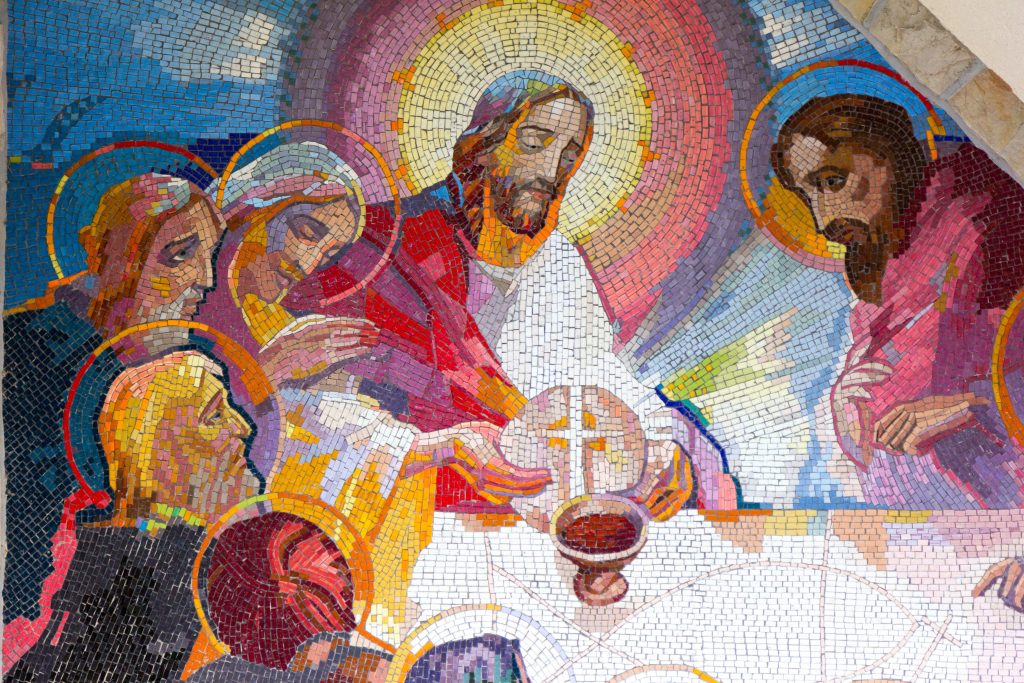In different places throughout the city of Los Angeles these days, you can see festive banners along the streets remembering the Monterey Pop Festival of June 1967.
There is a special exhibit on the festival running now at L.A.’s Grammy Museum. And all throughout California, especially in San Francisco, they are commemorating the 50th anniversary of the “Summer of Love.”
There is something about American popular culture that seems to take comfort in nostalgia, looking back on the past.
In a way, we do that in the Church, too.
The Church’s calendar is a series of “rememberings.” We remember events that happened, like Christmas and Easter. We remember the dates when saints were born or martyred. Every day, year after year, we are remembering those who have gone before us in the Church.
At the heart of our memory is the Eucharist. Our Lord’s words at the Last Supper cast our whole Christian life in terms of remembrance: “Do this in memory of me.”
We live from this command. We live to carry out his command.
For the Church, memory is a powerful and living thing. It is not a sentimental journey. We are never simply looking back and wishing for the way things used to be.
What we are remembering is the “event” of Jesus Christ — his coming into the world, his death and resurrection for our salvation.
For Christians, memory is always a way of thanksgiving. We give thanks that in his mercy God has “remembered” his holy covenant.
Our memory is also sacramental and personal. What we remember — God’s love and his promise of redemption — is made real in the Eucharist for us.
We live in a global and commercialized society, and the rhythms of life seem to get faster with each passing year. We have become accustomed to “change” as a constant feature of our existence.
In the process, our lives seem to be more fragmented and more isolated from others. We have our own memories or the memories of our own “group.” But we have far fewer collective memories that bind us together in our common humanity — far fewer memories to help us give meaning and make sense of our lives.
Maybe this is why our pop culture and social media always seem to be trying to create a sense of shared experiences and memories. Facebook even has a feature called “On This Day: Memories” — it reminds users of something they shared on a given date in years past.
As a people, we seem to be longing for continuity and connection. So right now we are remembering the “Summer of Love.” Next year it will be something else.
But what the human heart longs for cannot be fulfilled by marketing campaigns or manufactured memories.
God alone satisfies. The memory of God’s mighty deeds — the great story of his love in human history — this is what the world needs now.
The memory of God’s love is not a “passing fancy” or a “fad.” There is no “summer of love” in the Church. God’s love is for all seasons.
Recently I celebrated Masses to remember the lives of two Los Angeles saints. The first was Venerable Bishop Alfonso Gallegos, a priest from Watts who had a beautiful ministry to our society’s outcasts and forgotten ones. The other was Venerable Maria Luisa Josefa of the Blessed Sacrament, a refugee of religious persecution who founded the Carmelite Sisters of the Most Sacred Heart of Los Angeles.
This week, on July 1, we will remember the feast of St. Junípero Serra, the great missionary who helped to found Los Angeles.
Pope Francis remembered St. Junípero recently in Rome. He was talking about the saint’s motto — “¬°Siempre Adelante!” (“Always Forward”) — and he said: “I believe this is a synonym for the Christian vocation.”
Every saint is a living embodiment of God’s promise of love. Every saint speaks to us personally: “Look at me and see who you can be! Look at me and see the kind of person you were created to be!”
Memory is part of the “sacramental imagination” that distinguishes us as Christians. As believers, we know that this world is more than what we can see, touch or taste.
The bread that we eat in the Eucharist is more than bread. The wine is more than wine. The holy men and women who went before us — they are historical examples for us. But they are more than that. They are also intercessors and advocates who help us from heaven.
Pray for me this week and I will be praying for you.
Our Blessed Mother Mary told us that God remembers his mercy from age to age.
Let us ask her to help us to proclaim the memory of God’s mighty deeds to our world today. To help our neighbors to see that God is everywhere and in everything, that all of creation is the living story of his love.
You can follow Archbishop Gomez daily via Facebook, Twitter and Instagram.

